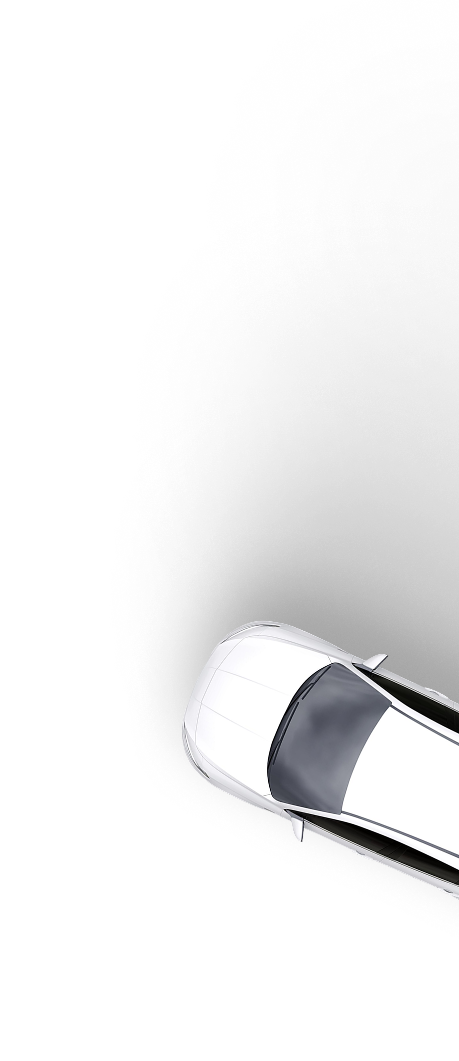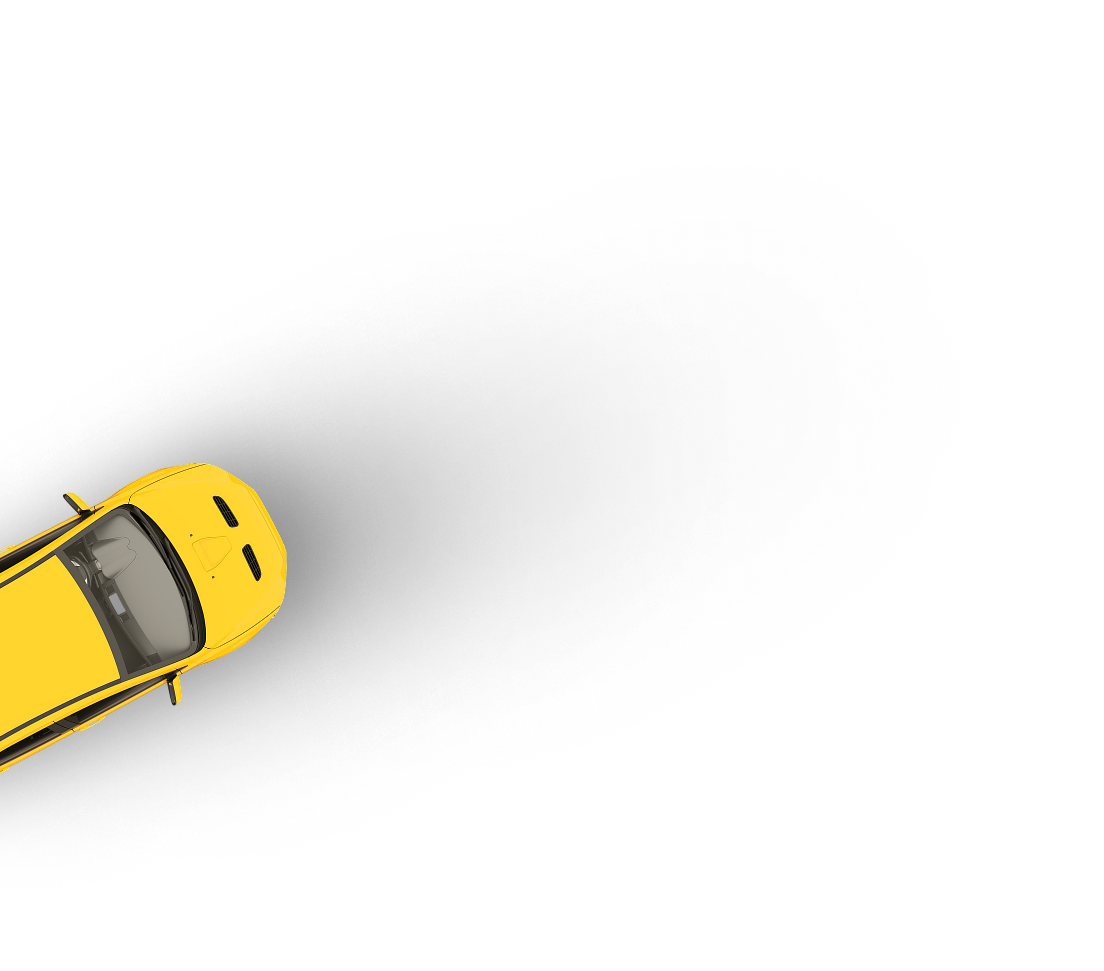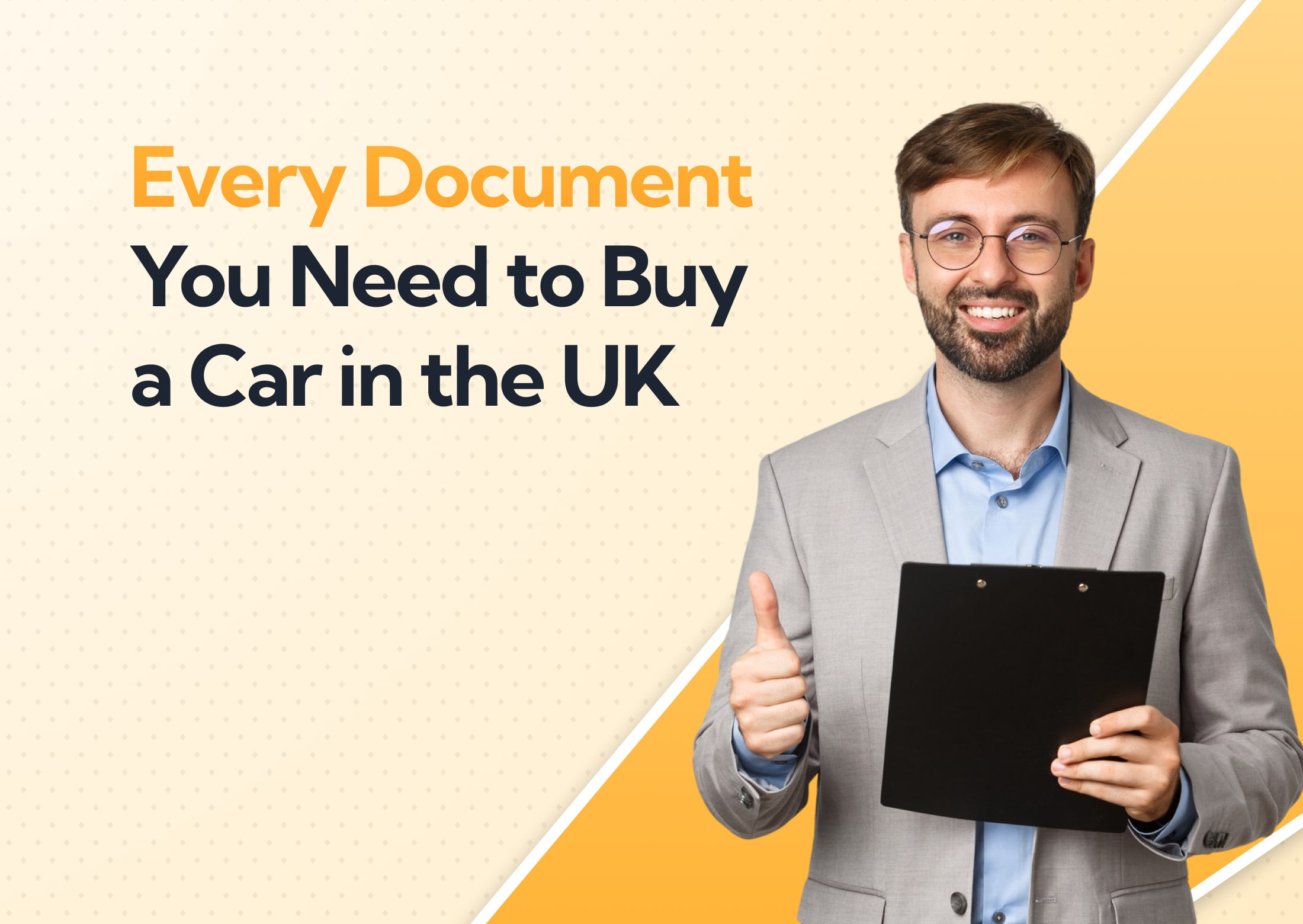Trade to trade car marketplace


Trade-only marketplace
Flexible selling options
Maximise your profits
Buying a car in the UK? This guide breaks down every document you need before, during, and after the sale. Learn what to bring, what to check, and how to avoid costly mistakes so you can buy with confidence and drive away legally from day one.
Last updated: 4th August, 2025

Listen to this story
Buying a car is exciting, but if you don’t have the right paperwork, it can turn into a headache fast. Whether you're buying privately or through a dealer, you'll need to bring a few key documents with you and double-check that the seller hands over the right ones too.
In this guide, we’ll walk you through exactly what paperwork you need before, during, and after the purchase, so you can drive away legally and with peace of mind.
Before you scroll through listings or step onto a dealer forecourt, make sure you’ve got a valid UK driving licence, proof of address and identity, insurance quotes or policy documents and, if you’re financing the purchase, bank statements and payslips.
You legally can't drive without one, plain and simple. If you’re buying a car, this is the baseline requirement. You’ll also need it to test-drive the car and get insured.
You’ll need these when registering the car in your name. A utility bill, council tax statement or bank letter usually does the trick. Make sure they’re recent (dated within the last 3 months), or else they won’t be acceptable.
You can’t legally drive a car away without valid insurance, even after buying it. Get quotes in advance, or better yet, arrange a policy to start the day you plan to collect the car. That way, you won’t have to deal with phone calls and paperwork at the point of sale.
If you're going the finance route, lenders will want to see proof of income and affordability. Have your last 3 months’ worth of payslips and bank statements ready if you want to qualify for a car loan.
Once you’re serious about buying a car, you’re going to want to go through some key documents before handing over any money. These are how you register the car in your name, prove its history and maintenance quality and record the sale.
The V5C logbook is the single most important document in any car sale. It proves who the registered keeper is and confirms the car is officially recorded with the DVLA.
Here’s what to check:
The seller will fill out section 2 (new keeper details) and give you the green “new keeper” slip (section 6). They’ll also register the sale online.
You don’t need a paper MOT certificate anymore because everything’s stored digitally. But you do need to check the MOT status and history before you buy.
Go to the Car.co.uk MOT history and MOT status checkers and enter the registration number. You’ll be able to see:
This gives you insight into how well the car has been maintained and whether it’s likely to need work soon. If the car has a long list of advisories or fails MOTs often, think twice.
Pro tip: For peace of mind, only buy cars with a current, valid MOT unless you're comfortable arranging pickup (you cannot legally drive a car without a valid MOT), testing immediately after purchase and potentially paying for repairs.
If you’re buying a used car, particularly one that’s older, has prior accident damage or has a salvage title, the service history is crucial. It shows you how well the car’s been maintained over time. Oil changes, timing belt replacements, brake jobs and major repairs will be recorded here.
You want to see:
No history isn’t necessarily a deal-breaker, but it should raise questions and could affect resale value later.
The bill of sale is your written proof that the transaction took place. It should include:
It protects both parties in the case of a dispute and gives you a paper trail for tax, insurance and ownership purposes.
Getting an independent inspection (or at least a basic vehicle history check) is one of the best moves you can make. Services like HPI Check or AutoCheck cost around £10-30 and tell you:
It’s a small cost that’ll save you from a massive mistake if you end up uncovering something sketchy. Doesn’t matter if the seller seems trustworthy, don’t skip this step.
Note: If you’re buying a new car, the process is a lot more straightforward. You’ll be the vehicle’s first registered keeper, so there will be no history or existing documents to worry about.
Most of us aren’t dropping the full amount upfront. If you’re taking out a loan, signing up for PCP or leasing a vehicle, you’ll need to prove you can afford the monthly payments. That means handing over a few extra documents before you get approved.
Lenders need to see that you’ve got a steady income. You’ll usually be asked for the last 3 months’ payslips, recent bank statements and a P60 or tax return. This shows them you're not a risk and helps them determine how much you can borrow.
If you’re not a UK citizen, you’ll need to show your legal right to live and work in the country. That could be a visa or residency permit, a biometric residence card or any documents that confirm your settled or pre-settled status. Without these, finance providers probably won’t approve the agreement.
You won’t have to bring this yourself, it’s something the lender will pull. But it’s worth checking your credit score ahead of time so you’re not blindsided. You can use services like Experian, Equifax or ClearScore to see where you stand.
A stronger credit score = better chances of approval and lower interest rates.
Once the deal is done and the keys are in your hand, you aren’t 100% out of th woods yet. There are still a few things that you have to do before you’re able to drive off with your fresh new ride.
If you’re buying a used car, the seller should give you the green “new keeper” slip (V5C/2). The DVLA will then post you the updated V5C within 2-4 weeks. Or, if the seller registered it for you online, you’ll receive it in 3-5 working days.
Didn’t get it in the mail? You’ll need to contact the DVLA or apply for a replacement using Form V62.
This should clearly show the car’s details, the agreed-upon price, date of sale, and both parties’ names and signatures. It’s your legal proof of purchase, meaning it’s your best friend if anything about the sale is disputed later.
Even though MOTs are digital, get confirmation of its current status because it’s illegal to drive on public roads without a valid MOT. As for road tax, it doesn't carry over (the seller gets refunded if you’re buying used), so you’ll need to tax the vehicle yourself before driving it away. You can do this instantly online using the V5C/2 slip at gov.uk/vehicle-tax.
If you're buying from a dealership, chances are good the car comes with a manufacturer’s or dealer warranty. You might also have third-party warranty coverage.
We recommend reading the fine print: look at duration, mileage limits, and what parts or systems are actually covered.
Easy to forget, but incredibly useful:
These small details make a big difference later and they’re expensive to replace if you don’t get them now.
You’ve got the keys, the paperwork and hopefully a great big a grin on your face. But you’re still not quite done yet. There are X final steps to make sure you’re driving legally and avoiding fines.
It’s your legal responsibility, not the seller’s, to tax the car as soon as you buy it. Road tax doesn’t transfer with ownership, so even if it was taxed yesterday, it’s no longer valid in your name.
You can do tax your vehicle instantly online using the new keeper slip at gov.uk/vehicle-tax.
Driving without insurance is illegal and carries serious penalties that include fines, points on your licence and the car being seized.
Set up your insurance policy to start on the day you collect the car. If you’ve already got a policy, you can usually switch it over or add the new car online or via a quick phone call.
And if you’re driving a new car off the lot, you can even purchase drive-away insurance, a kind of temporary insurance that covers you on your drive home while you wait to arrange a longer-term policy.
If you live in or are heading into London, check whether your car meets Congestion Charge and ULEZ (Ultra Low Emission Zone) standards. This is easy; check your registration with this free ULEZ compliance checker and see if any charges apply.
If we could go back and talk to our younger selves before buying our first car, we’d save mountains of stress with just one word: paperwork. Most people get tripped up not because they don’t care, but because they don’t know what really matters until it’s too late.
Now, we’re in the car business. We’ve bought and sold enough cars to know the pain of missing documents, dodgy sellers and DVLA headaches you could’ve avoided with one simple check.
So here’s what first-time buyers get wrong and how to make sure you're not one of them:
This one’s brutal. We’ve seen buyers walk away with a car and no clue the V5C logbook was outdated, marked as a duplicate or filled out improperly. If the seller’s name doesn’t match the registered keeper or key sections are missing, walk away. Without a proper V5C, you can’t tax the car, transfer ownership or prove it’s legally yours.
Yeah, people still try this (though it’s less and less common now that everything’s digitised). If you’re not paying attention, you’ll get stung.
Don’t accept a piece of paper at face value. Always check the MOT status online using the GOV.UK MOT checker. It takes 10 seconds and it shows the full history. If what the seller tells you doesn’t match what the database says, something’s off.
Just because someone has the car keys doesn’t mean they legally own it. If the car has outstanding finance, it belongs to the lender, not the seller. That means you could lose the car completely if they’re delinquent on their payments. £10-30 for an HPI check is nothing compared to that risk.
Buying the car is step one, getting covered is step zero. You legally need insurance the moment you take ownership and any mods (even basic ones) must be declared or your policy could be void. Call your insurer, update your policy and don’t assume “I’ll sort it later” is good enough.
Handshake deals are cool until something goes wrong. No receipt? You’ve got no proof the sale ever happened and no legal standing if you need to report fraud or make a claim. Always get a signed, dated receipt with full buyer/seller info, car details and the agreed sale price. It’s a five-minute job that could save you thousands.
Award-winning automotive entrepreneur, tech innovator, and founder of Car.co.uk, NewReg.co.uk & Recycling Lives.
One of the most common mistakes we see is buyers rushing into a deal without verifying the basics. That’s how you miss something like outstanding finance or a fake V5C. In today’s used market, paperwork tells the real story of the car. If you skip those checks, best case scenario is you’re buying a car with loads of issues. Worst case is you’re buying a stolen car you don’t have the right to own.
If you’re not a UK citizen, the process is nearly identical to buying as a UK resident. All you need is a valid UK address, a valid driving licence and proof of insurance.
Now… for the driving licence, that might complicate things a bit. If you don’t have a UK licence yet, how soon you need to get one depends on whether you’re from the EU/EEA or outside it.
Start with the basics:
Also look for any signs of tampering. Missing pages, correction fluid and mismatched fonts are major red flags.
Finding the perfect vehicle is just half the battle. What you’re really worried about on the backend is getting the paperwork right from start to finish. If you show up unprepared or skip key checks, you’re opening yourself up to fines, delays and potentially buying a car that’s problematic.
Make sure you’ve got the right documents before browsing, verify everything the seller hands you and don’t drive off without insurance and tax in place. Take the five extra minutes here and there to double-check everything now and we guarantee you you’ll save yourself hours (and potentially thousands of pounds) down the line.
No. You need a residential address to buy and register a car in the UK. It doesn’t have to be where you live full-time, but it must be a place where you can reliably receive post. The DVLA will send your new V5C logbook to this address. It’s where you’ll receive tax reminders, speeding fines and other official notices.
Providing a false or fake address is serious business. It’s considered fraud and can land you in legal trouble. So even if it’s temporary housing or a mate’s place, make sure the address is real and accessible.
Don’t panic. MOT certificates are now stored digitally, so there’s no legal need for a paper copy. You can verify the car’s MOT status and history in seconds using the GOV.UK service. All you need is the registration number
No, there’s no legal requirement for a service history. But if there’s no record of maintenance, you’ve got no clue how it’s been treated or if it’s about to fall apart. That’s why we recommend you always ask to see it. You're not just buying the car, you're buying how it's been looked after.
Yes, but only if it’s insured, taxed and has a valid MOT. Even if the car is mechanically sound, driving it without those three things is illegal. You can sort insurance ahead of time and tax it online in minutes.
Definitely. It’s your proof of purchase, and it protects you in case of disputes or future legal issues. Keep both a digital copy and a hard copy just in case something goes wrong with the vehicle or the seller.
Nope. Car tax doesn’t carry over to the new owner. The moment the DVLA is notified of the sale, the previous owner gets a refund for their unused tax and it’s up to you to sort new tax before driving.
No tax = no legal right to drive. Simple as that.

